Stop Fighting Your Short Attention Span—Use It
Mining Gold from Mental Chaos, or, how to hack your ADHD into being more useful
This is a craft themed post based on a writing and research question I get a lot - how do I chomp through so much research? I thought I would answer this question at length for you.
One: reading a book or longform essay is not an act meant to punish you. You can stop at any time and move on to something else.
I read on average maybe 5 books at a time and sometimes up to 15; I generally read one book a day and have for years. I recognize this sounds unhinged, and that you are maybe imagining me sitting in a pentagram surrounded by books with my hands hovering above them. That is only sometimes true. In reality I skip through books like I’m changing channels, taking notes and leaving flags of attention and for future returns in certain passages, writing down favorite lines in my tablet or commonplace journal. Sometimes I make poems within the texts I’m reading, and that helps me remember them - because I am working with them.

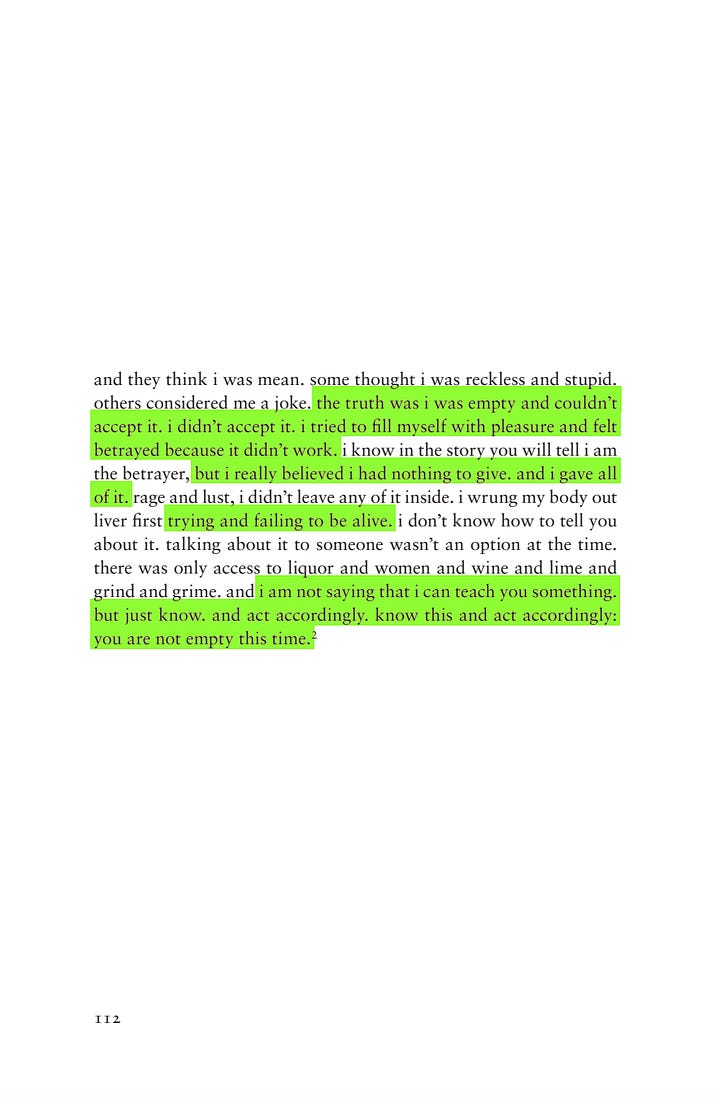
I’m a very polite reader and usually read a book nearly to the end no matter how bad it is, because I am rooting for the writer to get their shit together and stick the landing. Sometimes they do, sometimes they don’t and the mediocrity of their finished attempt is still a kind of inspiring (if them, why not you etc). When something is not quite working I move from being a reader enjoying the vibes to an examiner assessing a wounded body, dissecting what perhaps should have been done before it arrived at my door. Reading something clunky becomes a kind of workshop. This is a way I reclaim my time: I have not wasted it, I am using it to learn what not to do.
I read a lot of academic texts that most people would never consider immediately related to beauty, and a lot of poetry, too. I wouldn’t even say I finish most of them immediately. I tend to flip through the same stack of readings over the course of weeks, months, in a long, winding conversation with all of them. When I start to zone out in an academic text I’ll switch to poetry which has a totally different parameter of information and attention packed into a very limited amount of words. Another way of describing it is like circuit training for my brain. I’m going from something that takes four pages to make one point comprehensively, backed by lots of research, to a poem that makes a big point in fifteen words. Then I’ll do something else and think about any connective tissue between the points I’ve just observed.
This circuity has helped me read many things in a short period of time. Rather than forcing my way through something I’m losing interest in I just… try something else. It’s not a failure to do so. Your brain might need the break to process what it’s learning, that's all!
It’s the repetition, not the length of time, that helps me remember things. It accumulates through regular and ritualistic attention, even if I’m not in something for very long.
Two: deface your own books without apology. Ideas are meant to be approached!
I love marginalia and when people leave keepsakes and ephemera in their books - I prefer buying used copies of books if I can in the hopes of finding someone else’s scribbles in them, if I’m being honest! There’s this one regular at You & Me Books in New York City’s Chinatown who leaves the best marginalia I’ve ever come across - little poems in the front, endless arrows and highlights and sometimes tarot cards or index cards breaking down why they loved a passage or how the book changed their life. Whenever I’m at the bookstore I hope I find a book she’s read to buy. It would be easy to fall in love with her just from reading her ephemera - finding her book trails is like being on a long date with someone I'll never meet. I cherish hanging out with her reading experience - and I hope to be read so closely one day, too. (*cough* pre-order The House of Beauty!)
When I buy used books online, I always get the less than perfect copies for higher chances of marginalia. I want to read with other people. They might teach me something I wouldn’t have thought of otherwise. It’s also why Kindle highlights are so fun; you get to see what other people agree is a good line or not.
While certainly I’d never deface a library’s copy or a friend’s book without asking first, I think it’s important to study a text in whatever way makes sense for you to retain what it’s telling you. Dog ear pages. Highlight a bunch. Stuff it with post its filled with your reactions to stuff!

Three: read out loud to yourself when you’re stuck or really moved.
This is something I do when I’m revising, for sure, but also when I’m hitting a block in reading. I try to talk out the problem. Similarly when I’m thrilled by a turn of phrase I speak it out loud because I want to share it with whoever is around me (usually my partner, who does not care what I am reading but entertained by my enthusiasm). This is especially helpful around people whose first language may not be English and they don’t get the idioms as precisely; then we’re talking about why it’s clever or interesting and maybe exchanging idioms and thinking about different ones.
Reading out loud - your own work or others - helps you understand the pacing, the alliteration, if dialogue is clunky or a sentence is a run on. Maybe you retain information better hearing it out loud. Oral histories are the oldest stories humanity has, no? So if your attention span is dead for written texts, find the audio companion if it’s available. You’re still reading. It’s fine.
Four: Retention relies on reflection and repetition. Write that shit down, babe.
My ability to retain information I’ve read even in passing is pretty psychotic; whenever people (still) ask about a quote I may have blogged in passing on Tumblr many years ago I know where it’s from immediately. I remember these things because I’m re-writing them or screenshotting them into folders on my Cloud storage and attributing them correctly. If I like something and want to remember it I write it down exactly and them write why I like it (or what it’s bringing up for me). That personal connection helps me remember things for a very long time. And I categorize by personal theme/vein of research. Nothing exists in a vacuum. Pattern recognition helps retention.
It is ok to me personally if I don’t have perfect recall of exact phrasings to things because I leave myself breadcrumbs to fall back on in order to find the phrasing exactly, through themed tags and archives. When you flood yourself with references with specific structure, you can begin to trace them back to the origins from which they came.
I’d love to consider memory like a flood. But for me, I store information in my brain like objects in space; big ideas are an architecture I build, restructure, and renovate constantly, though trauma tends to move in the building like a flood, or a current that breaks things. You may think of your memory like a garden you’re continuously working on - sometimes realizations grow without your attention on them.
Some people do journals and really spend a lot of time with their commonplace books. I will not be showing you mine today. It’s a bit too much like sharing a nude.
Here are some from other Substackers, though:
does really cool printables for their paid subscribers and workshops, etc: shows her monthly spreads - she might inspire your structure if you’re overwhelmed with options:There’s also
!I do not believe any writer or artist is above journaling or note taking in some capacity. It’s vital to have putter-space, where you aren’t just writing for pay (or the hopes of it); it’s important to have little containers for doubt, for sheer pleasure, for the act of simple study of some wordsmithing you want to treasure.
I think writing your dreams down explicitly and putting them side by side the things that inspire and move you, is a kind of alchemy. I am not the only writer who thinks this way, either. I revisit Octavia Butler’s journal entires on an annual basis.
Her ambition and her delivery of her dreams inspires me, every day. So be it! See to it! I loved Hanif’s essay on it from a few years ago.
How do you study? How do you pay attention to things?
There is a rise in stationary culture right now so I am making the rounds of different New York City stamps/journaling/ephemera stores to make my own personal ranking. I’d love your suggestions, of in-person or online places you buy writing things. Or if you wanna share your creative process - feel free. I always like to read about how other people think.
Feel free to share some love for your favorite journaling Substackers in the comments too.
Much love,
Arabelle

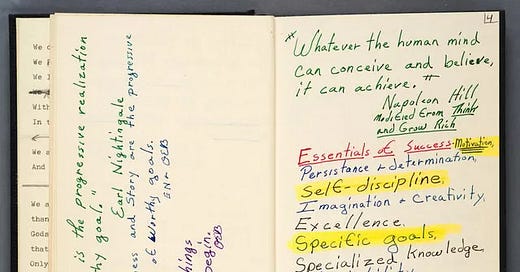

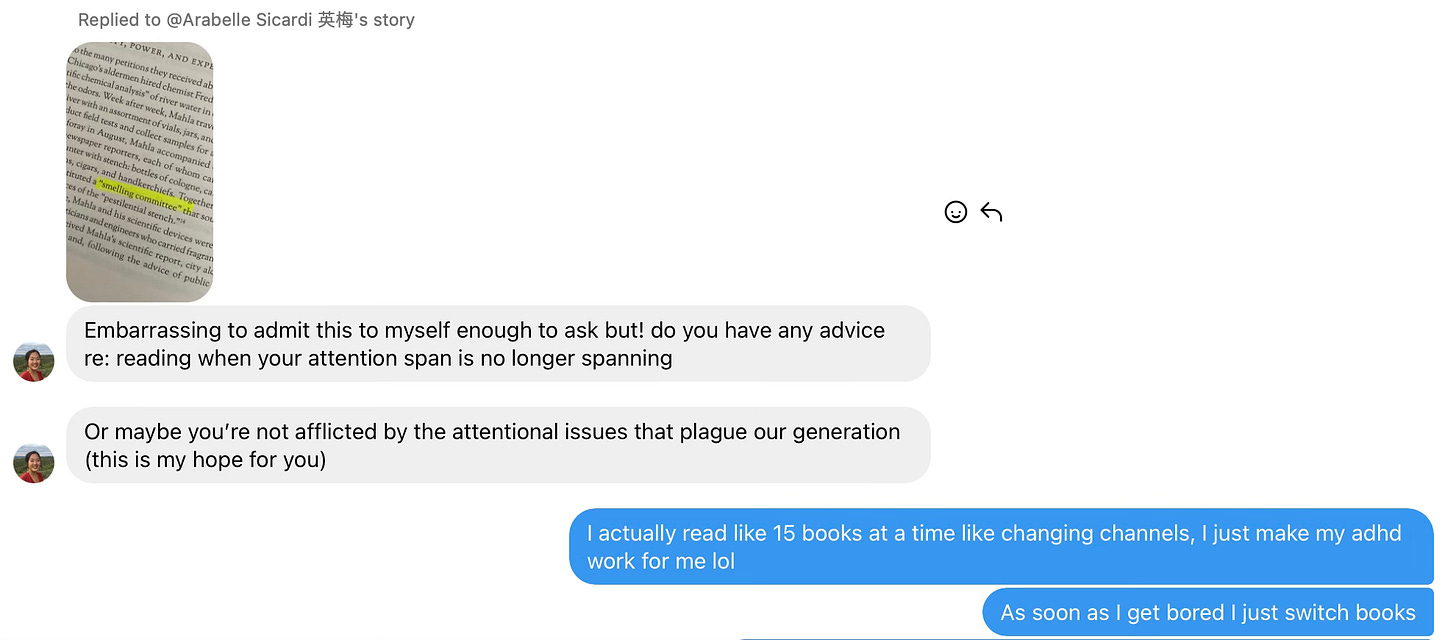

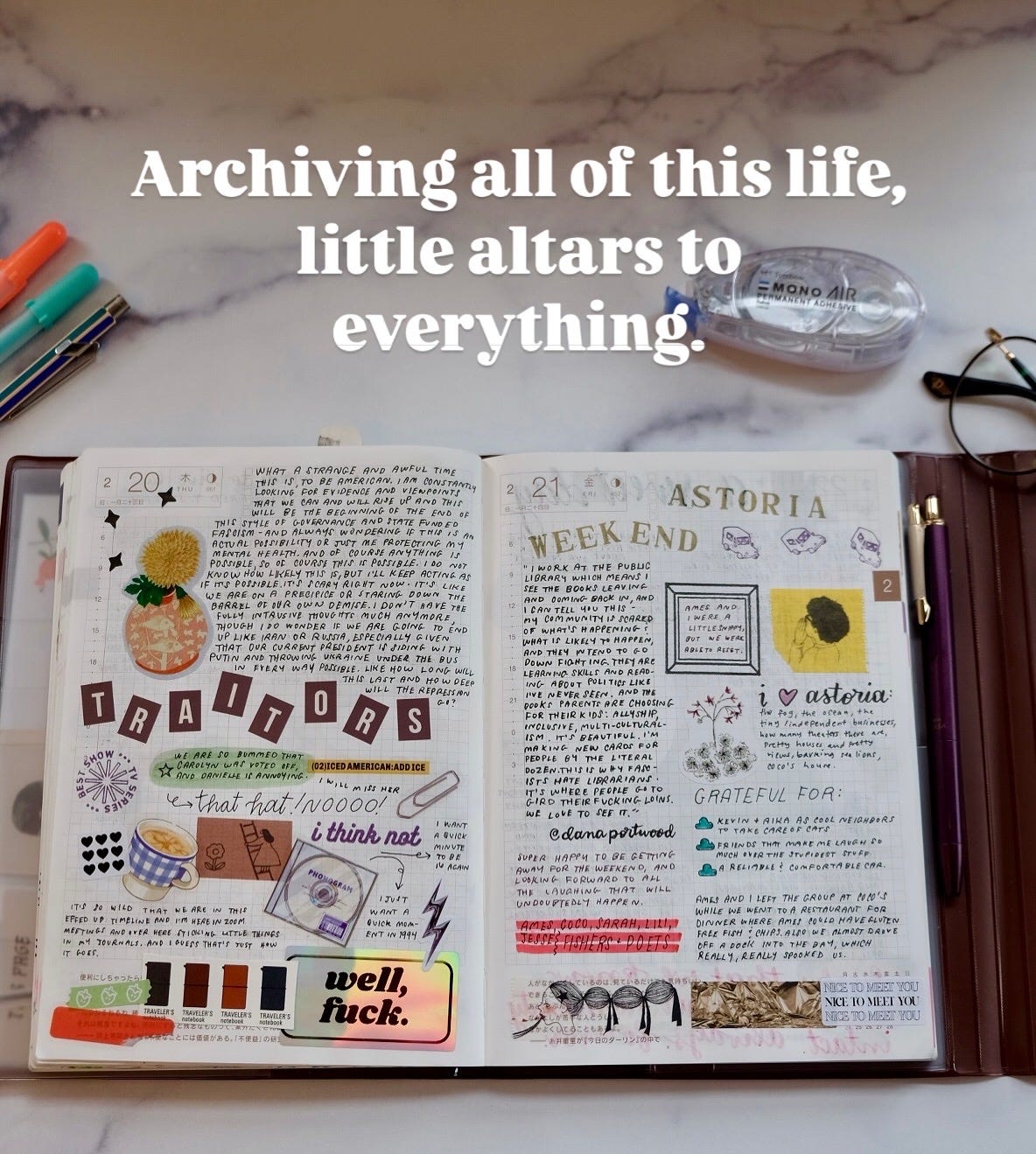
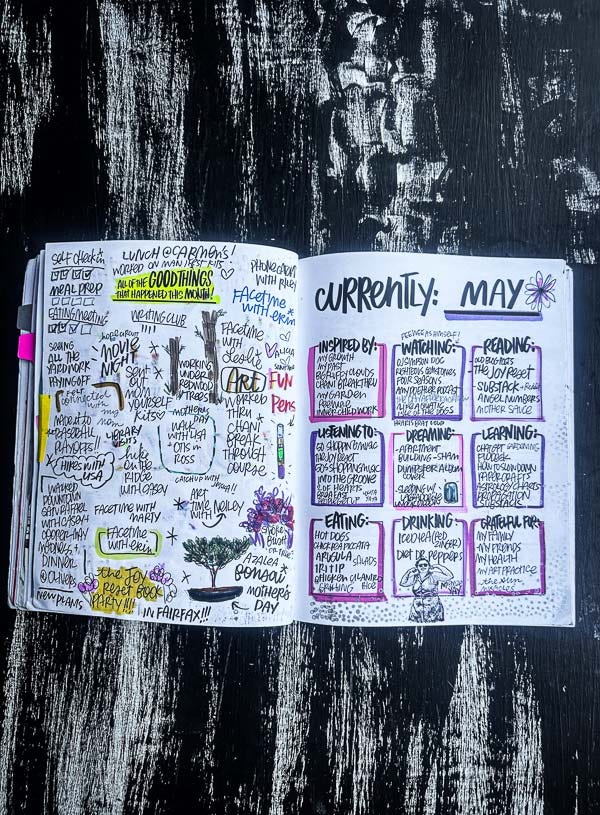

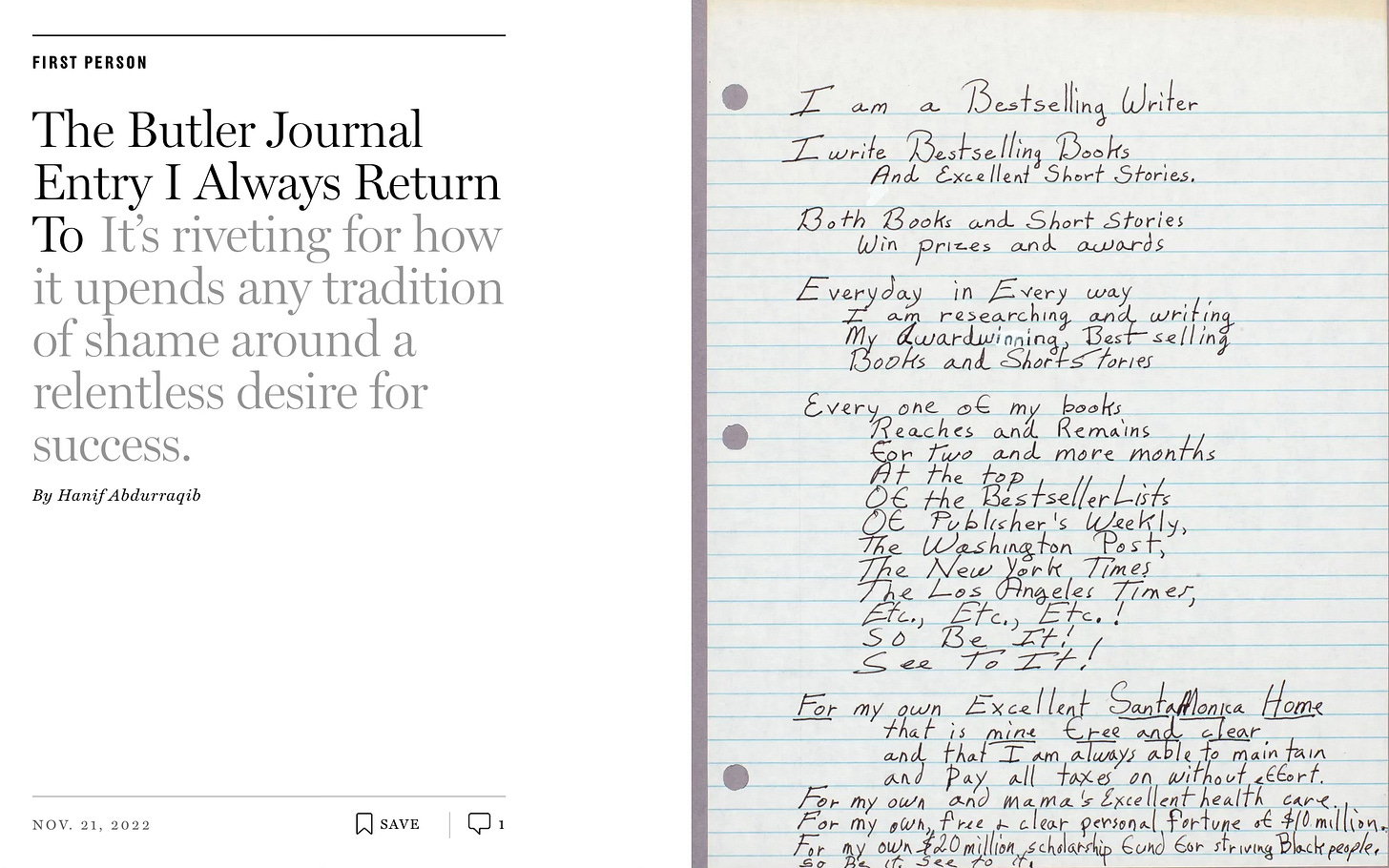
I loveeee this post Arabelle!! Been trying to get through TWOOO non fiction books that are super interesting but I find myself turning the page and then forgetting what I’ve just read 😂 so I end up rereading a lot. I love the phrase of being a “polite reader” lol x
Greenwich Letterpress's sticker wall for stationary and The Moon List substation for journaling prompts!